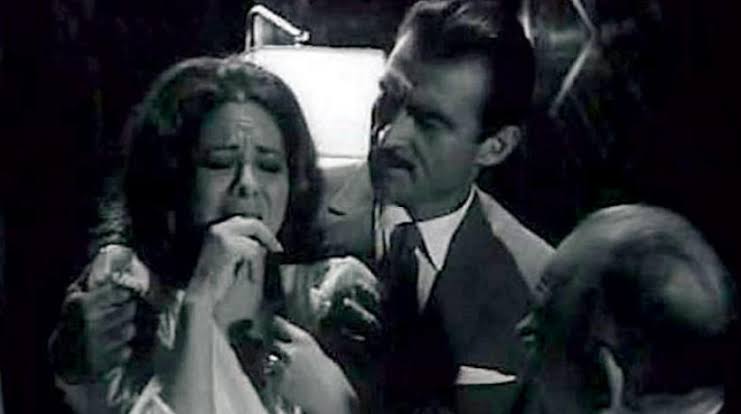When Nadia Borhan Sadek woke up, she never thought that she would find herself in another house with another identity.
With a well written drama, the Egyptian black and white thriller movie Al-Layla el-Akhera (The Last Night) (1963) is considered one of the best movies of the 1960s starring Faten Hamama, Ahmed Mazhar and Mahmoud Morsi.
As the movie starts, Sadek (Hamama) thinks she is in 1942 on the day of her wedding, but as she wakes up she finds herself in an unfamiliar room and a man (she knows that he is Shaker, the husband of her sister) comes in calling her Fawzia (her sister’s name). Through the early events, she knows that today is her daughter’s wedding (the daughter whom she does not recognise).
She then looks at a wedding invitation to find that she is in 1957, which means that she has lost 15 years of her life about which she remembers nothing.
Sadek insists that her name is Nadia not Fawzia (which is the name of her sister). So, she tries to find proof of her true identity, but Shaker tries his best to hide the truth and eventually he tries to kill her in order not to discover his secret. But, the doctor (Ahmed Mazhar) feels that there is something wrong and tries to help her.
One of the most poignant scenes is when Sadek decides to go to the cemetery to make sure that Nadia really has died. She sits in front of the grave on which Nadia’s name is written and an inner voice inside says: “If the one who lies in this grave is Nadia, who am I?”
Directed by Kamal El-Sheikh, who is known for thrillers and remarkable films like Al-Manzel Raman 13 (Home Number 13) (1952), Beer el-Herman (The Well of Deprivation) (1969), El-Tawoos (The Peacock) (1982) and others, the movie is truly an unforgettableclassic.
The Egyptian movie is loosely based on the US filmMy Name is Julia Ross (1945) filmed in black and white and directed by Joseph H. Lewis and starring Nina Foch, May Whitty, and George Macready. Julia Ross (Foch) is hired as a live-in secretary for Mrs Hughes (Mary Whitty) in London. Two days later Julia wakes up to find herself in a strange house, and everyone calls her as Marylin, Mrs. Hughes’ daughter-in-law. We later discover that Mrs Huges’ son (George Macready) killed his wife and threw her body into the sea. So, they brought Julia and gave her the wife’s identity to convince everyone that the wife lost her mind and committed suicide.
With its dark atmosphere, suspenseful plot, and mysterious characters, the film is an enjoyable watch. However, the Egyptian movie, screenplay written by Youssef El-Sebae, is much more enjoyable and the plot is more compelling. Also, the acting was superb.
As usual, Faten Hamama gave an outstanding performance as Nadia. She conveys the character’s inner turmoil and confusion perfectly. Also Morsi mastered his portrayal of Shaker, the deceitful husband. The supporting cast also does a great job in bringing their characters to life, especially Alia Abdel Moniem (the tailor).
The soundtrack by composer Victor Young also adds to the atmosphere, creating thrill and anticipation.
Nominated in 1964 for the Palme d’Or award at the Cannes Film Festival, The Last Night is an excellent blast from the past. It’s a must-see for anyone interested in Egyptian cinema or looking for an emotionally powerful drama.




